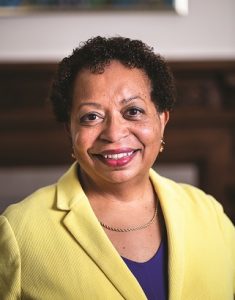Entrepreneurial at our core

In September, we launched our new Center for Entrepreneurship. Some say that entrepreneurial thinking is a natural extension of a liberal arts education because it promotes creative problem-solving, innovation, persuasion, and risk-taking. I would go further to say that an entrepreneurial spirit is at our core.
The spirit of innovation is evident throughout our storied history of successful Trinity College alumni who have invented and led. As we define it, an entrepreneurial spirit finds solutions where solutions are not apparent. Entrepreneurship requires that we formulate a problem clearly, interrogate our received knowledge of the limits of the possible, persuade others to our point of view, experiment without fear of failure, and persist to the ultimate solution. I take pride in the entrepreneurial spirit of our students, faculty, and staff, which is demonstrated in their research projects, student ventures, and campus initiatives.
The new center, led by inaugural director Danny Briere, will provide any liberal arts major, not just those interested in business or start-ups, with the confidence and skills to engage their entrepreneurial spirit, connecting students and faculty with alumni and other world-class entrepreneurs and innovators. For those who wish to pursue their ideas further, the center will help them with their product or company launch.
I see this center as a logical extension of the Trinity Plus curriculum, the innovative liberal arts curriculum that was introduced last year. The curriculum enhances the strength of Trinity’s core liberal arts education with the power of applied and experiential real-world learning experiences (i.e., internships with alumni, international study, community-based learning, and research with faculty). The “plus” credits, beyond Trinity’s required 32 academic credits, provide students the time, flexibility, and agency to develop experiences best suited for their particular interests—any combination of academic credits, co-curricular credits, or completion of a faculty-designed three-credit experiential certificate. The activities in the center will correlate and align with the curriculum.
As a neuroscientist turned college president, I can attest to the value of my own liberal arts education. It’s also true of our recent graduates, with our latest data indicating that 97 percent of 2021 Trinity graduates were employed, in graduate school, or participating in volunteer/service work within six months of graduating.
A liberal arts education prepares us for life and for almost any job, not for a specific job after graduation. Here at Trinity, we educate strong, agile thinkers prepared to take risks and to challenge conventions. In the company of a connected community—small classes, esteemed faculty, and motivated peers—students are prepared with broad knowledge of the wider world and subject-specific, in-depth areas of study. They learn to shift and adapt, to embrace an exchange of ideas necessary for society to function and thrive. A student’s major does not define the person that student will become or that student’s eventual profession.
A liberal arts education allows our students to master critical reasoning skills, deal with complexity, develop social responsibility, communicate effectively to different audiences, and demonstrate the ability to apply knowledge and skills in real-world settings—such an approach is entrepreneurial at its core.
As we look toward our Bicentennial this year, we can do so knowing we are prepared to usher in a new century of Bantams with a liberal arts curriculum built for today and tomorrow—one that prepares our students well to lead in the future and that elevates Trinity to enter our third century of excellence.